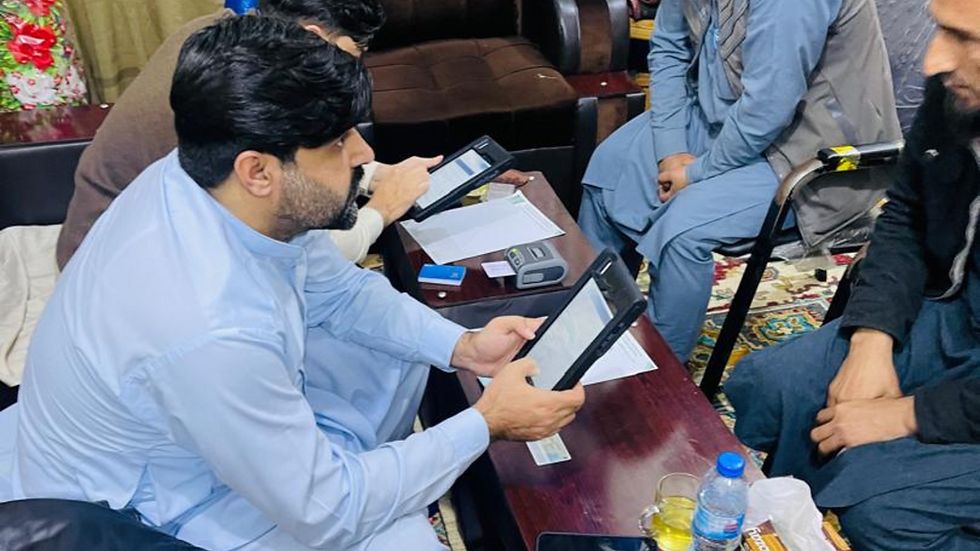
In Afghanistan, access to financial services remains a challenge for many, especially those without traditional bank accounts. Recognising this need, Afghanistan International Bank (AIB), in partnership with Paycode Pty Ltd, has launched a groundbreaking initiative to digitise financial transactions for Donors, NGOs, and Corporates across the country.
The Shift to Digital: Why It Matters
While AIB’s Pay On ID system has served the bank well in providing door-to-door cash payouts, the move to a biometric smart solution is a game-changer. This digital system offers multiple benefits, including:
Proof of Life & Identification – Ensuring funds are received by the intended beneficiaries.
Verification & Authentication at Pay-Out – Eliminating fraud and mismanagement.
No Duplicate Beneficiaries – Preventing system redundancies.
Real-Time Biometric Reporting – Providing instant visibility into transactions and beneficiaries.
Full Auditability & Traceability – Ensuring compliance and transparency.
Fund Reconciliation – Tracking distributed and paid-out funds accurately.
24-Hour Data Mining & Reporting – Enabling quick and informed decision-making.
Online & Offline Functionality – Ensuring continuous operations, even in remote locations.
How It Works
Through this initiative, AIB and Paycode are biometrically registering beneficiaries and issuing them a biometric smart card. This card allows users to securely receive salaries, wages, or stipends and withdraw cash at any AIB branch, partner bank, or AIB agent network across Afghanistan. The partnership with New Kabul Bank (NBK) further extends access, with over 75 touchpoints, including AIB branches and New Kabul Bank locations, now equipped with biometric-enabled Point of Sale (POS) devices.

Growing Adoption
Since December 2024, more and more corporates are recognising the value of this biometric smart card system. Six organisations have already signed on, taking the first step towards nationwide implementation. Employees from OSAA - Organisation for Sustainable Aid in Badghis Province, ARAA - Ansari Rehabilitation Association across Badghis, Farah, and Ghor Provinces, and RSDO - Razi Social Development Organisation in Herat Province are now receiving their salaries seamlessly each month. Meanwhile, MADCC - Mohib Advance Design Construction Company in Kabul and KICS - Kabul Ideal Consultancy Services in Balkh Province are in the process of getting their employees onboarded. SHPOUL - Sound Humanitarian Participatory and Organisational Uplift in Kunar Province has also embraced this technology, ensuring secure and efficient payments for its employees. And with MSH - Management Sciences for Health gearing up for registrations soon, this system is well on its way to revolutionising salary payments across Afghanistan.
Feedback from the Ground
The transition to this biometric smart card system has received positive feedback from both AIB branch managers and beneficiaries:
Branch Manager Insights:
Branch managers have found the system to be incredibly easy to use and intuitive. It has significantly reduced the need for manual preparation work, streamlining reconciliation and accounting processes. With these efficiencies in place, staff now have more time to focus on other important banking tasks.
Beneficiary Feedback:
Beneficiaries have praised the system for its simplicity and user-friendly nature. It ensures the safety of their funds while providing the flexibility to make partial withdrawals as needed. Additionally, with 24/7 access to funds through multiple touchpoints, users can enjoy greater convenience and financial control.

Looking Ahead
This initiative is more than just a technological upgrade; it’s a step towards financial empowerment and inclusion in Afghanistan. By digitising salary and stipend distribution, AIB and Paycode are ensuring that even those without a traditional bank account can participate in the financial ecosystem securely and efficiently.
As more organisations onboard and adoption grows, this biometric smart card system will set a new benchmark for financial services in Afghanistan, demonstrating how technology can bridge the gap between accessibility and financial security.
